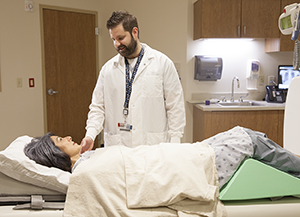A
B
C
D
E
F
G
H
I
J
K
L
M
N
O
P
Q
R
S
T
U
V
W
X
Y
Z
Back to Intro
Click a letter to see a list of medical procedures beginning with that letter.
Click 'Back to Intro' to return to the beginning of this section.
Having an X-ray
An X-ray uses a small amount of radiation to make images of your bones and organs. X-rays are most often used to look for bone or joint problems, or to check the heart and lungs (chest X-ray). They are also used to look for any hard deposits of minerals or salts in your body, such as kidney stones. You may also have an X-ray to check for problems in the bowel such as a blockage or free air in the belly (abdomen). X-rays are also used to look for a foreign object in your body, such as metal. This can be from an injury or a swallowed object.

Tell the X-ray technologist
Tell them if you:
Before your test
Before the test starts, you may be asked:
-
To remove your watch, jewelry, or clothes with metal closures from the part of your body being X-rayed. These items can block part of the image.
-
To put on a hospital gown
-
About your overall health and any medicines you take
During your test
Here is what to expect during the test:
-
You may be asked to sit, stand, or lie on a table.
-
A lead apron may be draped to protect the areas of your body not being X-rayed.
-
With an X-ray of your chest or belly, you may have to take a deep breath and hold it for a few seconds.
-
Each exam usually needs at least 2 X-ray views. You may need to move your body before each new X-ray view.
After your test
Your healthcare provider will discuss the test results with you during a follow-up appointment or over the phone.
They may advise other imaging tests (such as an MRI or a CT scan) or more X-ray views if needed. This is done to confirm the diagnosis.
Online Medical Reviewer:
Marianne Fraser MSN RN
Online Medical Reviewer:
Raymond Turley Jr PA-C
Online Medical Reviewer:
Shaziya Allarakha MD
Date Last Reviewed:
3/1/2024
© 2000-2024 The StayWell Company, LLC. All rights reserved. This information is not intended as a substitute for professional medical care. Always follow your healthcare professional's instructions.